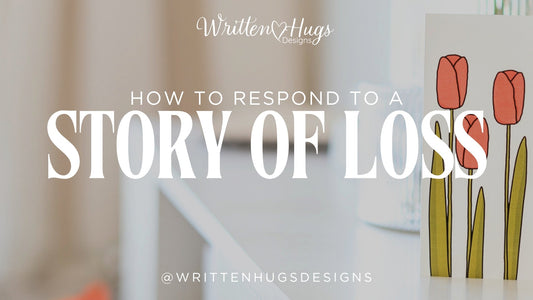An Easy to Follow, Step-By-Step Guide that answers what to say to someone’s story of loss
What do you do when someone shares a traumatic story of loss with you? What do you say? What do you do? My name is Christi. I've been through a lot of different kinds of loss in my life, child loss, deaths of close loved ones, and more, and now I work in this space. I started a greeting card company that helps people feel more seen and less alone, especially in moments when words are hard to find. For example, when someone is grieving during the holidays. I have learned a lot over the years, and I want to share with you a step-by-step, how-to guide that is easy to follow and profoundly, profoundly powerful.
Why are they sharing this traumatic or tragic story of loss with you?
When people experience loss like this, they are reminded every day in big and small ways of their loss. They often mask how many triggers are affecting them throughout the day and they may appear to function normally. The weight of their loss build with every trigger and every reminder. When they interact with other people, they are gauging whether or not that person is a safe person to share a part of the weight of their loss with. They may perceive that you are a safe person because of your job, because of your aura or energy, or they are so overwhelmed with the weight of their grief, they are hope hope hoping you are a safe person to share it with.
What are they actually asking of you?
When someone shares their loss story with you, they are asking you if you would be willing to share the weight of their grief with them for a moment. They are inviting you to take a step into their world that they normally don’t share to be present with them so they aren’t alone.
How people typically share their loss stories and what to expect
Overtime, I have noticed that the way people share their loss stories have three major characteristics in common, and it is helpful to observe these similarities to know what to expect and to better understand what they are asking.
First, they describe the relationship they had with the person who died, but not their name. For example, they will say: my dad, my mom, or my brother, but they typically don’t include their person’s name and say: my dad, Jim, my mom, Patty, My brother, TJ.
Second, they describe the way their person died. They will say things like: My dad had a heart attack, my mom died in a car accident, my brother had cancer.
And third, they describe how they themselves experienced the death of their loved one. For example, my dad had a heart attack. Here's how I found out. I was in a room with this coworker. To this day I can’t be in the same room as them without having a panic attack.
Note that although they are being very vulnerable with you in telling you their loss story, they are still uncertain if you are a safe person.

Step 1
Attentively Listen to their Loss Story
Give them your full attention. Listen to what they are sharing. Allow yourself to feel the emotion behind what they are sharing and how it might have felt for them to live through that. Remember the unspoken ask behind the story they are sharing (as described above). They want to know if you are a safe person to help them carry the weight of their grief for a short period of time that you share together.

Step 2
Ask their Name and What They Were Like
If you don’t already know, ask them what their person’s name is and what their person was like when they were alive. I want you to note their person’s name is sacred. It may have been a long time since they spoke their person’s name aloud or heard someone else speak their person’s name aloud. It may have been a long time since they’ve been empowered to share stories of what their person was like. This is really precious information they are sharing, and very very vulnerable.
By responding in this way, you are essentially communicating to them that you will enter their space with them. You will help carry the weight of their loss. AND you will see them more fully, understand their loss more completely, because you are not only hearing the story of their loss, you are hearing the story of their life.
As they begin to share, get really curious about who this person was. What qualities does the person in front of you most admire about their person? What stands out to you? Were they kind-hearted and generous? Did they have a wicked sense of humor with an extra helping of sass? Ask questions to get to the essence of who they were.
Suggested follow up questions:
- What was your favorite thing about them?
- What was your favorite thing to do with them?
- What always made them smile?
- What do you admire about them?
Pay attention to tangible parts of their person’s life story that occasionally intersect with your life. What in the world does that mean? Were daisy’s their favorite flower? Did they collect rooster? Did they have a favorite song? Did they have a favorite sports team? These beautiful tangible pieces are perfect reminders that set us up for Step 3.

Step 3
Honor Their Memory
As you are listening to them share about their person to get to the essence of who this person was, pay attention to at least one aspect of their character that touches you about their story. For example, let’s say the person was kind-hearted and generous and adored daisies and this stuck out to you.
Once you the person is finished sharing about their person, say something like, “Thank you so much for sharing all of this with me. I’m honored to now know how kind-hearted and generous (so-and-so) was. Thank you for sharing such precious memories with me and so I could be a part of remembering their legacy with you. Thank you.”
What you are doing in Step 3 is utterly profound. You are effectively communicating to them:
- I see you
- You matter
- You are not alone
- Your person matters
- They are not forgotten

Step 4
Release the Emotional Weight
As you move forward from this interaction. Take a moment to energetically release any emotional weight from their story that you may be carrying. A simple way to do this is by visualizing a ball of light and mentally putting the emotion you feel attached to the story into that ball of light. When you are finished. Release the ball of light to the universe.

Conclusion
This concludes my step-by-step guide for how to navigate these hard conversations. I have found it is helpful to understand the “ask” behind the story, and how you can respond in an easy, yet deeply profound way. It's powerful, it's palpable, and I know you can do it. Thanks for listening.
If you use these steps in your life, would you please reach out to share your story with me? If you have any questions, please reach out, I’m happy to answer. Otherwise, thank you for listening.
To send questions please email: Christi@writtenhugsdesigns.com




